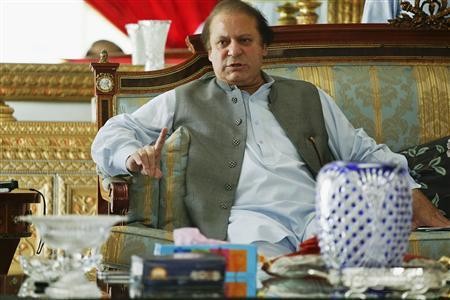(VOVworld) – One day after his victory in Pakistan’s general election on May 11th, Prime Minister Nawaz Sharif discussed with independent senators the formation of a government and key ministerial posts in his cabinet. Sharif’s sense of urgency shows that he is aware of the big challenges his new government must handle. The primary tasks are to restore the economy and maintain security.

Pakistani Prime Minister Nawaz Sharif speaks to foreign reporters at his residence in Lahore May 13, 2013. (Credit: REUTERS/Damir Sagolj) |
Prime Minister Nawaz Sharif assumes office at a critical time for Pakistan’s economy, which is experiencing high unemployment and sluggish production. An energy crisis has left many areas blacked out 20 hours a day. Pakistan, which has a population of 190 million people, has had a growth rate of less than 3% for three consecutive years. 2 million jobs are being lost annually. These problems drew strong criticism down on the previous administration. Pakistan is facing a deficit crisis. Last year, the country’s GDP growth fell 3% while the inflation rate climbed to 11%. Pakistan’s leaders hope to reduce the budget deficit to 4.7% of GDP in this fiscal year. But almost all analysts expect it will be much higher and warn that the new government may need a bailout of billions of USD from the International Monetary Fund.
Extremist and terrorist activities occur every day in this volatile Islamic nation. On election day, at least 32 people were killed and 224 were injured in 40 attacks across the nation. During the last 22 days of the campaign, 110 people were killed, including 3 candidates. 350 people were injured by bomb attacks and gun fire.
Two-time former Prime Minister Nawaz Sharif thoroughly understands these problems. He has introduced his motto “Strong economy, strong Pakistan”. To achieve it, his new government must focus on improving the economy, combating corruption, and seeking solutions to the energy crisis. Sharif has promised to promote an open market economy, maintain the current privatization policy, and reduce the price of electricity.
Speaking to his supporters after the victory, Sharif called for reconciliation and asked all parties to return to the negotiating table to solve Pakistan’s problems. Before that, he publicly offered to talk with the Taliban, the Islamic extremist responsible for most of the violence during the election. Sharif wants to slow the rise of extremism which has been going on for nearly 7 years in Pakistan.
Pakistan’s atmosphere is jubilant as people express their hopefulness that the country now has an opportunity to change. But change will depend a great deal on how Nawiz Sharif handles his third term at Pakistan’s helm.